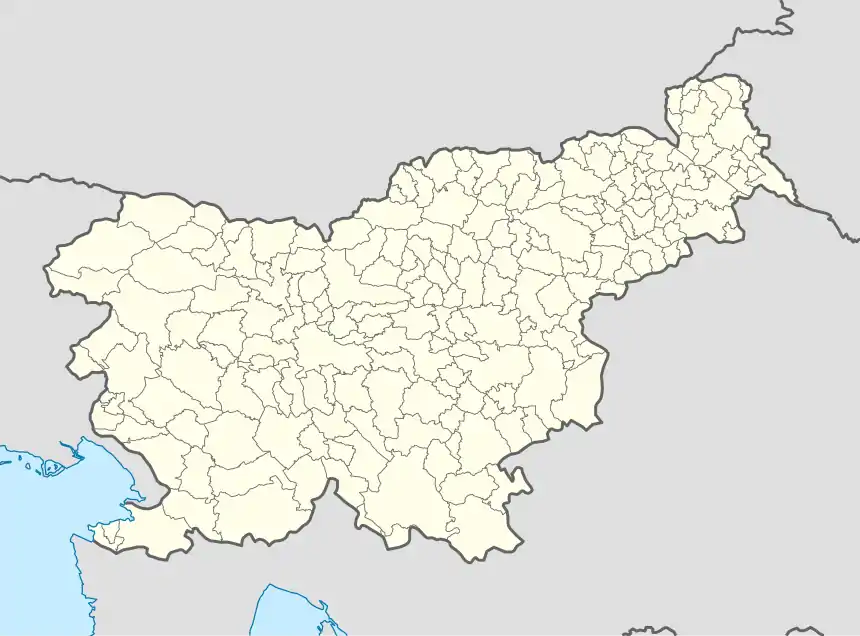Ravne, Kočevje
Ravne (pronounced [ˈɾáːwnɛ]; German: Eben;[1][2] Gottscheerish: Ebn, Ebnə[3]) is a remote settlement in the Municipality of Kočevje in southern Slovenia. The area is part of the traditional region of Lower Carniola and is now included in the Southeast Slovenia Statistical Region.[4] Its territory is now part of the village of Borovec pri Kočevski Reki.[5]
Ravne | |
|---|---|
 Ravne Location in Slovenia | |
| Coordinates: 45°33′24.93″N 14°46′23.00″E | |
| Country | |
| Traditional region | Lower Carniola |
| Statistical region | Southeast Slovenia |
| Municipality | Kočevje |
| Elevation | 746.8 m (2,450.1 ft) |
| Population (2002) | |
| • Total | none |
Name
Ravne is a relatively common name for places in Slovenia (cf. Ravne, Ravne, Ravne na Koroškem, etc.). The name literally means 'level' and is of adjectival origin, usually an ellipsis of ravne njive 'level fields', referring to a small elongated cultivated terrace.[6] The German name Eben is semantically identical, meaning 'level' and referring to cultivation of the land.[3]
History
In 1498 Ravne had three full farms divided into half-farms,[5] corresponding to a population between 35 and 40.[3] In 1770 the village had 13 houses.[3] One of the executed ringleaders of the 1809 Gottscheer Rebellion was from Ravne.[7] The village had 18 houses and a population of 47 in 1937.[8] Ravne had a steam-powered sawmill, which was burned down during the Second World War. The village came under aerial bombardment during the war. After the war the Posestvo Snežnik company had a barn for cattle in Ravne.[5]
Pilgrimage chapel and shrine
A forest pilgrimage chapel known as Our Lady of the Woods (German: Maria im Walde)[9] was built between Eben and Borovec pri Kočevski Reki in 1905 at the site of the Eben Shrine (German: Ebener Bild[3] or Ebner Bild,[9] Gottscheerish: Ēbmar pillain[10]), a popular wayside shrine.[3] The church was built as a result of the 1855 cholera epidemic, during which the residents of Borovec pri Kočevski Reki would trek to the summit of Ravne Hill (German: Ebner Berg, 846 m) and the priest mentioned that a small church could be built where there was an shrine with an image of Our Lady of the Seven Sorrows, probably erected around 1440 or 1450 along a route to Rijeka for pack animals. The chapel was 10.5 m long, 5.5 m wide, and 15 m tall, topped by a flèche with two bells. It was built of undressed stone. The construction began on 5 July 1905 and the chapel was consecrated on 17 September 1905.[9] The chapel was destroyed during the Second World War.[11]
References
- Leksikon občin kraljestev in dežel zastopanih v državnem zboru, vol. 6: Kranjsko. 1906. Vienna: C. Kr. Dvorna in Državna Tiskarna, p. 34.
- Ferenc, Mitja. 2007. Nekdanji nemški jezikovni otok na kočevskem. Kočevje: Pokrajinski muzej, p. 4.
- Petschauer, Erich. 1980. "Die Gottscheer Siedlungen – Ortsnamenverzeichnis." In Das Jahrhundertbuch der Gottscheer (pp. 181–197). Klagenfurt: Leustik.
- Kočevje municipal site
- Savnik, Roman, ed. 1971. Krajevni leksikon Slovenije, vol. 2. Ljubljana: Državna založba Slovenije, p. 217.
- Snoj, Marko. 2009. Etimološki slovar slovenskih zemljepisnih imen. Ljubljana: Modrijan and Založba ZRC, p. 348.
- Kundegraber, Maria. 1991. "Die deutsche Sprachinsel Gottschee im 19. Jahrhundert." Etnolog. Nova vrsta 1:82–120, p. 83. (in German)
- Krajevni leksikon Dravske Banovine. 1937. Ljubljana: Zveza za tujski promet za Slovenijo, p. 217.
- Kundegraber, Maria. 1962. "Die Wallfahrten der Gottscheer (Mit 1 Karte und 7 Abb.)." Österreichische Zeitschrift für Volkskunde 65: 233–260, p. 239, abridged and reprinted in Gottscheer Gedenkstätte 47 (June 2010), p. 5. (in German)
- Tschinkel, Walter. 2004. "Auszüge aus dem Gottscheer Wörterbuch Band I + II von Dr. Walter Tschinkel" Gottscheer Zeitung 101(3) (March), p. 8.
- Slovenian Ministry of Culture register of national heritage reference number ešd 12860
